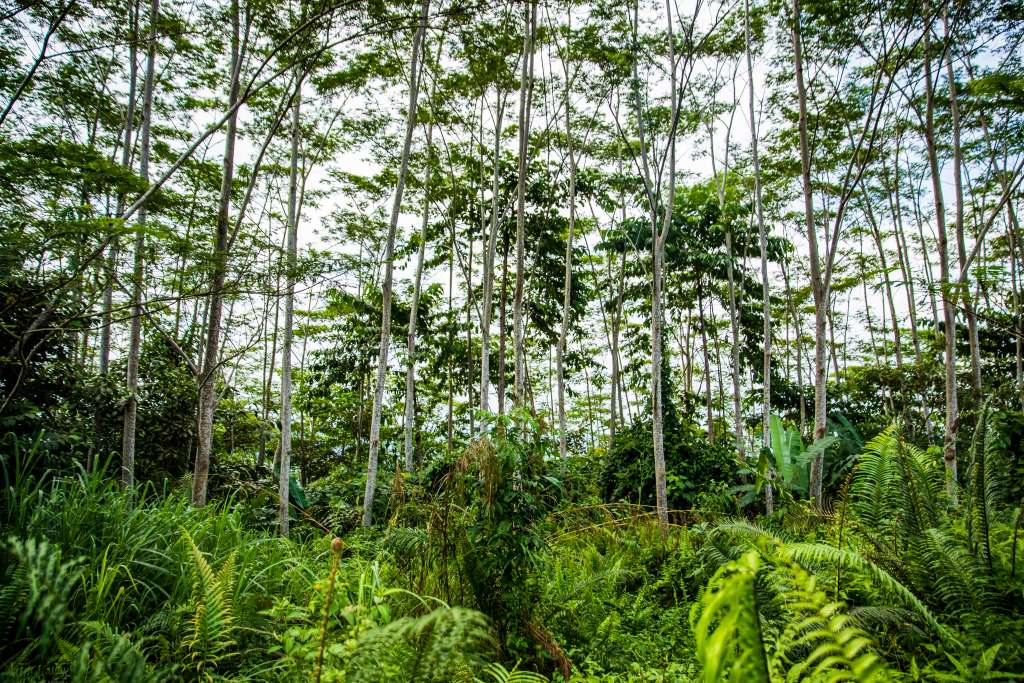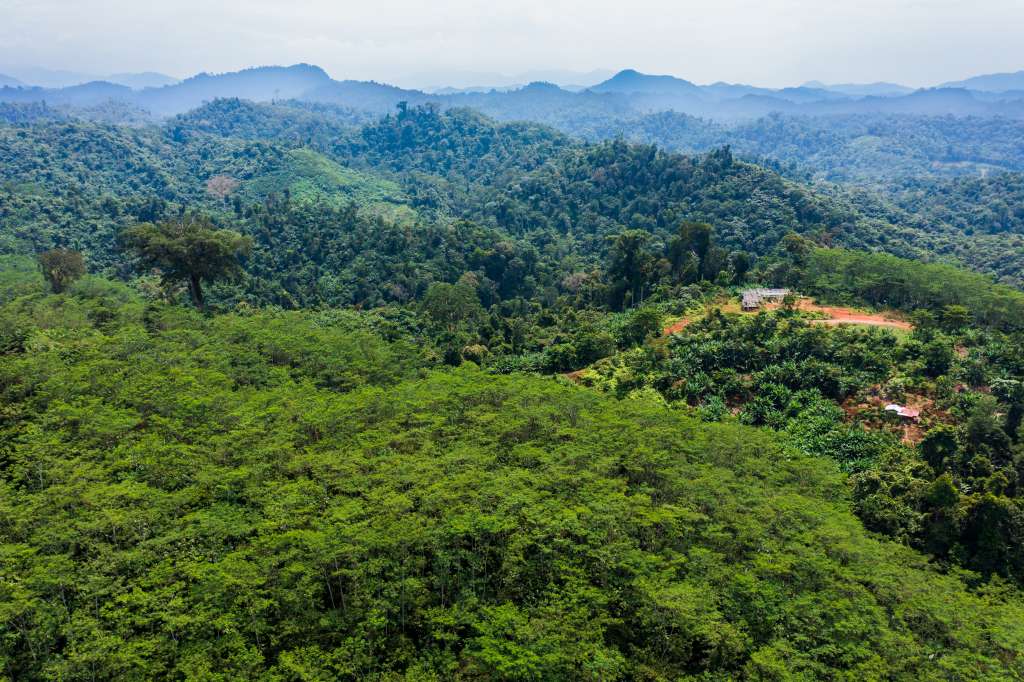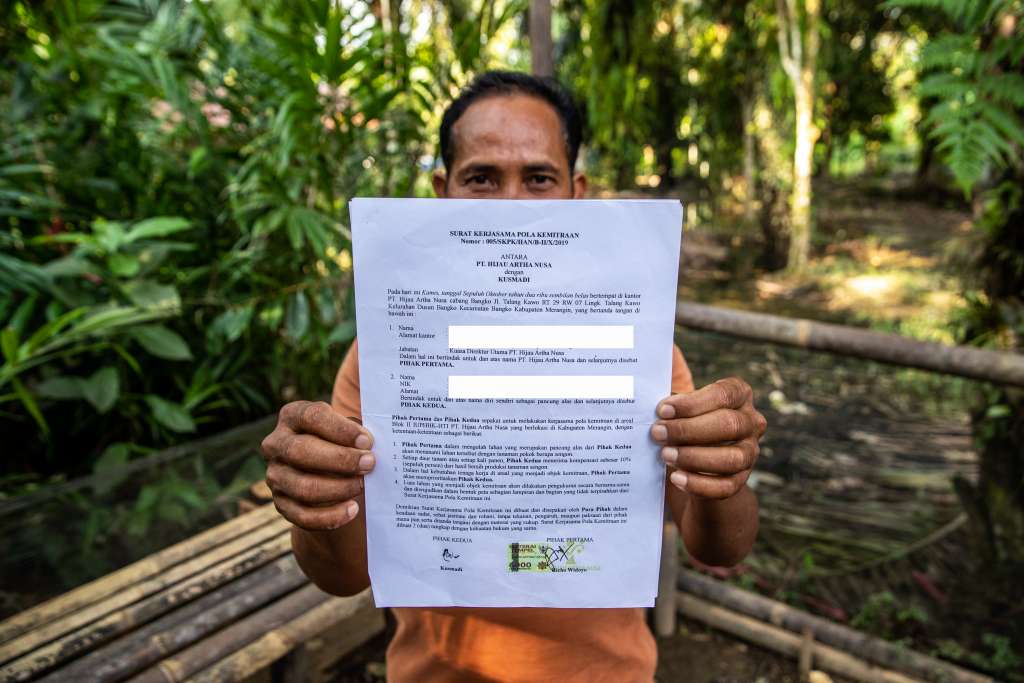Indonesia, with its commitment to reduce greenhouse gas emissions, has increased its targets in the “Enhanced NDC” which had been conveyed to the UNFCCC. This ambitious target demands a significant transition across various sectors, including forestry and energy. Amid these efforts, Energy Plantation Forests (HTE) are promoted as a controversial solution to achieve these targets, claiming to be a breakthrough in emissions reduction and increasing zero-emission renewable energy.
However, behind these claims, there are significant concerns regarding the impact of HTE on natural forests. FWI (2023) noted that HTE development has led to the deforestation of 55 thousand hectares and threatens 420 thousand hectares of remaining natural forests within 31 company concessions. HTE development is also suspected to be a mode for forestry companies to prolong land control.
HTE development is suspected to become a new driver of deforestation of Indonesia’s natural forests in the future. Currently, there are already 13 provinces implementing HTE, with one in Jambi. Ironically, instead of being a solution, HTE is used by Industrial Plantation Forest (HTI) companies to extend their hold on forest and land resources. PT HAN is the only forestry company currently registered with the Ministry of Environment and Forestry as an HTE company in Jambi
PT HAN pockets an HTE concession permit covering 32,620 hectares based on SK.183/Menhut-II/2013. PT HAN’s concession area is located in Merangin and Sarolangun Districts, expanding into three blocks, which are Tabir, Nalo Tantan, and Sarolangun. The investment of PT HAN is classified as a Foreign Investment. Since its establishment, the company’s operational and business development funds have come from South Korea. PT HAN is part of a South Korean renewable energy project in Indonesia.


To support this ambition, PT HAN is developing energy plantation forests using biomass wood. It is known that since its conception, the company was designed to fulfill the need of South Korea for wood biomass in the form of wood pellet, not for Indonesia. According to FWI calculations, PT HAN has only planted 64.5 hectares of Sengon trees. Meanwhile, PT HAN’s energy plantation plans until 2024 cover 18,087 hectares.
Officially, PT HAN’s operations have stopped since 2022 and 2023. It is known that PT HAN ran out of business capital after funding from South Korea was cut off following the death of the company’s owner. There are no longer any field or office staff working for PT HAN, except for two field security personnel.
Continuing the HTI/HTE development by PT HAN, which has already stopped, is like a difficult dream to fulfill. Eventually, PT HAN must accept the reality that rebuilding and developing energy plantation forests after running out of capital and leaving negative controversies in the village community is highly unrealistic.
PT HAN’s permit to develop energy plantation forests and export to South Korea can be said to be very off the mark. The BPHL report on the Monitoring and Evaluation of Forest Product Administration (PUHH) officially states that PT HAN has been inactive since April 2023. The report also mentions:
- Up to now, PT HAN has not prepared the RKUPH documents for the 2024-2034 period and the RKTPH documents for the 2024 period.
- In the RKTPH periods of 2021, 2022, and 2023, there were no plans and realization of activities such as seedling procurement, planting, maintenance, and harvesting.
- PT HAN has not submitted reports for monthly activity, boundary management progress, partnerships, certifications, finances, planting, production, and workforce.
- PT HAN has not implemented the utilization of timber products with silviculture systems according to forest conditions.
- PT HAN has not collaborated with local community cooperatives.
- Since April 2023, PT HAN has been inactive in forest utilization activities (camps, labor, operational equipment, and supporting facilities are no longer present in the working area. PT HAN is indicated to have abandoned the working area).
- PT HAN holds a Business Licensing for Forest Product Utilization (PBPHH) permit according to the Minister of Environment and Forestry Decision Number: 230/Menlhk/Setjen//HPL.3/5/2021 dated May 18, 2021, with types and production capacity permits such as veneer, KGG, and wood pellet.
During PT HAN’s operation, the logging conducted by the company caused severe damage to forest resources. PT HAN was proved to be only utilizing wood from natural forests. According to the Forest Product Administration Information System (SIPUHH), the volume of roundwood production from 2021 to 2023 amounted to 7,014 m3. Meanwhile, based on PT HAN’s SKSHHK from 2021 to 2023, roundwood totaling 14,851 m3 was transported (Forest Lumber Storage Area and Transit Storage Area).
The findings on the field show that deforestation has triggered conflicts with wildlife, such as the Sumatran Tiger. Since PT HAN began operations in 2019, land-clearing activities have been actively promoted. Subsequently, communities around PT HAN’s area began to frequently encounter Sumatran Tigers in village settlements. The damaged forests have caused Sumatran Tigers to lose their habitats. This is supported by FWI’s findings that forest damage at PT HAN has almost reached 4 thousand hectares from 2017 to 2023.

HTI/HTE development is synonymous with the deforestation of natural forests, and the local communities have already been pulled into the company’s interests. In 2019, PT HAN explored villages and offered cooperation with promises of monetary compensation to the government of Nalo Gedang Village, including communities with farms within PT HAN’s concession. The Village Government and the Community were promised monetary compensation for the harvesting activities of natural forest wood, planting and harvesting of tree crops, and including the transfer of community plantation land control to PT HAN.
PT HAN promised a profit-sharing scheme. Every cubic meter of natural forest wood harvested from community land/gardens would be paid IDR 25,000 to the people and IDR 50,000 to the village per cubic meter. Until now, the Village Government has only received IDR 100 million, despite the harvesting of a total of 14,851 m3 of natural forest wood. The communities are even still waiting for the should-be-shared profit promised by PT HAN from the Sengon tree harvesting, which has had no realization. As of this report is written in 2024, PT HAN has proven to not fulfill their promises despite commitments and agreements made with both the Village Government and the people.
Communities have no idea whether their cooperation with PT HAN will end well or badly. However, what is certain is that the forests have already been damaged, the wood has been cut and transported out. During its absence in the field, PT HAN collaborated with third parties to harvest natural forest wood. This poses potential losses to the state due to unrecorded opportunities or disparities reported in SIPUHH and SIPNBP. On the other hand, the community is always at a loss with the wood being cut without any benefit to them. The community will only get the possibility of experiencing future hydro-meteorological disasters if environmental quality is not improved.
Conclusion
The development of Energy Plantation Forests (HTE) in Indonesia, which was intended to be a step to achieve greenhouse gas emission reduction targets, has raised various complex issues. This initiative has proven to be a controversial step in reducing emissions and addressing the climate crisis. HTE has instead caused deforestation problems and other negative impacts on the environment and community life. HTE development will only lead Indonesia into emission debts due to the loss of natural forests in fulfilling its practices.
The facts about PT HAN, one of the companies holding an HTE concession permit in Jambi, show a prioritization of biomass supply to South Korea over meeting biomass energy needs in Indonesia. On the other hand, HTE exacerbates the spatial control situation. PT HAN’s permit is valid until March 25, 2073. The increasing population is not comparable with the land available to the community. Meanwhile, investments based on forests and land often end in natural resource damage.
So far, local communities have often been victims of unfair systems and implementations that do not provide economic benefits as promised. Asset distribution to indigenous and local communities in Jambi is crucial and a necessity to create sovereignty, dignity, and independence for the people in community-managed areas.
Anggi Putra Prayoga
Sempur Kaler Street No 62 Sempur Village, Bogor, Indonesia
+62 857-2034-6154
WALHI JAMBI CORRESPONDENCE
Dwi
Wijaya Kusuma Street Jambi – Muara Bulian Street No.5, Jambi City, Jambi 36125
+62 821-8030-4458



